Wintershall Dea’s roots reach back more than 100 years: Its predecessor companies Wintershall and DEA Deutsche Erdoel AG were among the pioneers of the German oil and gas industry. Both companies repeatedly made a mark with their technical know-how and skills and also enhanced their portfolio systematically. From the second half of the 20th century on, they increasingly became international players and secured challenging concessions worldwide. They have continued on that path together since the merger in 2019. The successful tradition of its forerunners is the foundation on which Wintershall Dea now operates.
Wintershall Dea have more than 120 years of experience as an operator and project partner along the entire E&P value chain. The company with German roots and headquarters in Kassel and Hamburg explores for and produces gas and oil in 11 countries worldwide. With activities in Europe, Latin America and the MENA region (Middle East & North Africa), Wintershall Dea has a global upstream portfolio and, with its participation in natural gas transport, is also active in the midstream business.
Wintershall Dea was formed from the merger of Wintershall Holding GmbH and DEA Deutsche Erdoel AG, in 2019.
GLOBAL OPERATIONS
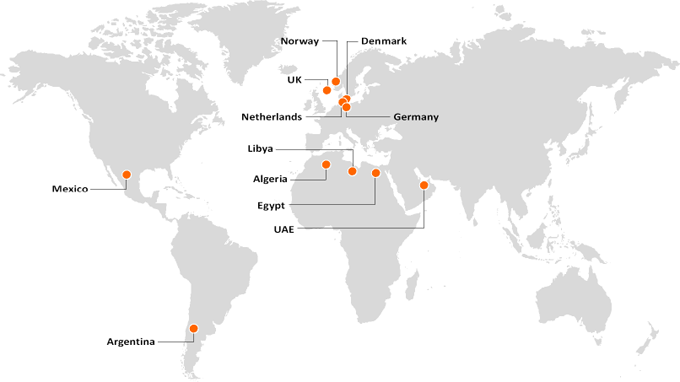
GERMANY
The oil and gas industry in Germany is mature, with production slowly declining over time for most assets. Activities are focused on the company's core production sites in northern Germany: Mittelplate crude oil production in Schleswig-Holstein, as well as natural gas production in the Verden area and oil production in Emlichheim, both of which are in Lower Saxony. In line with their strategy in the country, Wintershall Dea continued to optimise their operations and are actively engaged in the energy transition and progressing hydrogen prototype projects with partners to meet climate targets.
NORWAY
Wintershall Dea is now one of the leading gas and oil companies on the Norwegian Continental Shelf, having operated there for almost 50 years.
The company’s exploration and production concessions are located in all regions on the Norwegian Continental Shelf. Nova and Vega are located around 125 kilometres west of the city of Bergen. Maria lies further north, roughly at the level of Trondheim, and Dvalin lies even further north.
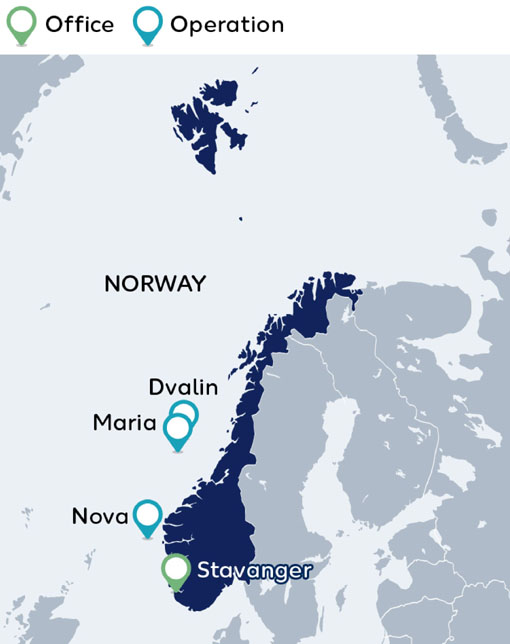
Dvalin
The Dvalin field was not considered worthwhile in the 1980s. It was not until the new millennium that a consortium led by Wintershall Dea (then DEA Deutsche Erdoel AG) successfully explored for natural gas. In 2010 and 2012, exploration wells struck two gas-bearing horizons with thicknesses of 150 and 140 metres respectively. To enable production from the field, four production wells are connected to the existing Heidrun platform, via a subsea template installed on the seabed.
Nova
The oil and gas reservoir was called Skarfjell when it was discovered in 2012 and was later given the name Nova. Besides Maria and Dvalin, Nova is another field in Norway that Wintershall Dea discovered and developed as operator. Nova came on stream in the summer of 2022. With Nova, the company is strengthening its position as an expert in subsea developments: The reservoir is connected to the nearby Gjøa platform via a subsea tieback. That saves resources and money, extends the economic lifetime of the Gjøa infrastructure, and unlocks future tie-in opportunities. As Gjøa is powered via hydropower from the Norwegian mainland, Nova is a low carbon-intensity field and contributes to Wintershall Dea’s emission reduction performance.
Njord
Production at the Njord field in the Norwegian Sea began in 1997 and was interrupted in 2016 for modernisation work on the floating platform being used. In 2022 the field started producing again, creating a renewed oil and gas hub and delivering substantial additional volumes. In total, the upgrade, which is part of the Njord Future project, will add ten new production wells. Wintershall Dea holds a 50 percent share in the field, with Equinor being the operator.
DENMARK
Wintershall Dea has been producing oil successfully off the coast of Denmark since 2003. Today, Wintershall Dea has equity in the two oil fields Cecilie and Nini which are located in the Danish Central Graben and expected to remain in production until 2024. Further, Wintershall Dea draws on the potential of CO2 storage technologies for a cleaner energy future as one of the core members of the Project Greensand Consortium.

Project Greensand Consortium
The Project Greensand Consortium aims to use depleted offshore oil reservoirs in the Danish North Sea to permanently store CO2 captured at onshore industrial facilities. The project has cleared a first major hurdle in fall 2020 with the certification of the Nini West subsea reservoir as a feasible gas storage. This certification confirms that the reservoir is conceptually suitable for injecting 0.45 million tonnes CO2 per year per well for a 10-year period and that it can safely contain the CO2 in compressed form. In August 2021, the consortium moved ahead to the pilot phase. The pilot's first offshore injection took place in early 2023. If successful, the pilot would lead to full-scale CO2 storage in the Nini West field by 2025. In December 2021, the project was granted a €26 million funding award from the Danish Energy Agency.
NETHERLANDS
Wintershall Dea has been active in the Dutch North Sea for more than 50 years. The company is today as a shareholder of Wintershall Noordzee, one of the larger producers of natural gas in the region. The portfolio includes the recently developed and operated Sillimanite and Sillimanite South natural gas fields Sillimanite, which reuses the topside from the retired Dutch E18-A platform, operates from three wells that came on stream between February 2020 and January 2021.
In addition to natural gas, Wintershall Noordzee has the intention to start producing oil from one of the largest oil discoveries in the Southern North Sea of recent years. The Rembrandt oil field was discovered in 2012 and is supplemented by the neighbouring Vermeer oil field. Both fields are located some 120 kilometres north of Den Helder within production licence F17a. Development plans were put on hold amongst others due to delays in the environmental permitting process but have recently been resumed.
Wintershall Dea envisages its operations in the Netherlands to become a prototype for implementing CCS (Carbon Capture and Storage) projects and managing the energy transition in the future. The depleted fields held by our subsidiary Wintershall Noordzee have significant CO2 storage potential and are located in proximity to CO2 producers onshore. The project realisation is supported by the regulatory regime of the Netherlands, one of the most progressive in Europe.
All of Wintershall Noordzee’s Dutch gas production platforms are unmanned and monitored automatically from the mainland. To enable that, the company runs the centre for Remote Controlled Operations (RCO) in Den Helder. That also makes production from small fields cost-effective. The gas fields Sillimanite and Sillimanite South straddle the maritime border of the Netherlands and the UK. The Rembrandt oil discovery is located approximately 120 kilometres north of Den Helder in the exploration concession F17a. It is complemented by the neighbouring Vermeer oil field.
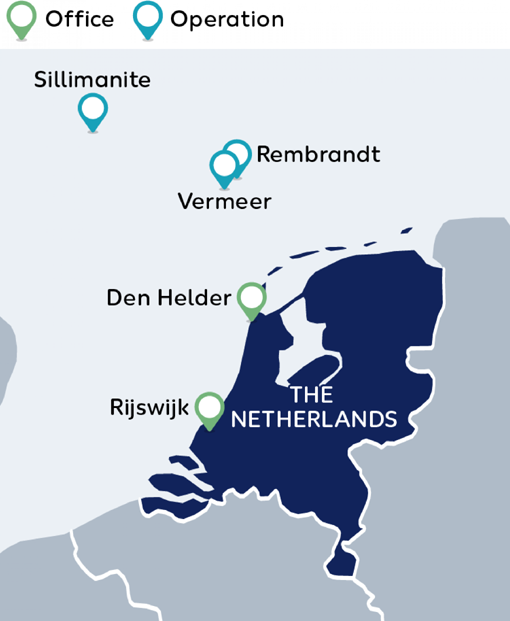
L6-B
L6-B is Wintershall Noordzee’s first mini platform and has been producing natural gas in the Dutch North Sea since 2015. It is operated, controlled, and supplied with power from a larger neighbouring platform. Wintershall Noordzee is the first company that has been allowed to produce here – the unmanned platform is situated in a restricted military area. That is why it was built to be extremely small and light. The strength of the new generation of mini platforms is that they can be used in very shallow waters.
UNITED KINGDOM
Off the British coast, Wintershall Dea has been producing natural gas since 2011.
Wintershall Noordzee exclusively operates offshore in the UK. The Wingate natural gas field belongs to licence block 44/24b and is located off the British coast, east of Scarborough. The Sillimanite gas field is situated directly to the north of Wingate and straddles the maritime border of the Netherlands and the UK. The company successfully started production from two wells from Sillimanite in February and June 2020. First gas from the Sillimanite South field was produced in January 2021.
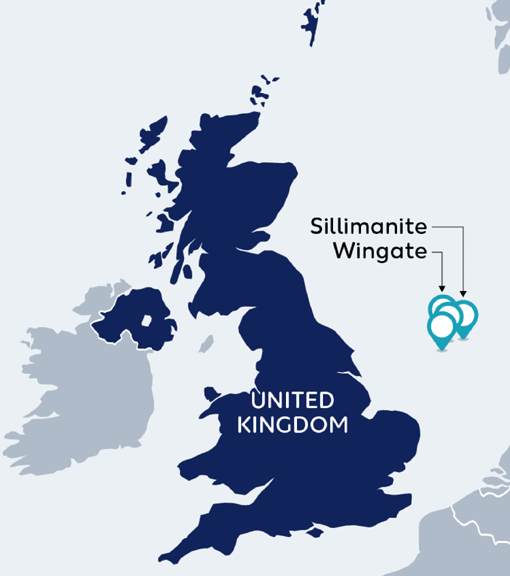
Wingate
The Wingate field is operated by Wintershall Noordzee and came on stream in 2011. To enable that, a 1,200 square metre production platform was anchored to the seabed. The unmanned platform is fully self-sufficient: A mini turbine power station generates electricity using the natural gas extracted directly from the field. Production is controlled using the company's own Remote Controlled Operations (RCO) telemonitoring system from Den Helder in the Netherlands. The gas produced is transported by pipeline to the nearby D15-A platform and from there to the Dutch mainland.
ARGENTINA
In Argentina, Wintershall Dea is a major supplier of energy and belongs to the country’s top five producers of natural gas. For more than four decades, offshore gas production in Tierra del Fuego has been a solid foothold for Argentina's energy supply.
Wintershall Dea has been active in Argentina for more than 40 years. The company is active in the provinces of Neuquén as well as onshore and offshore in Tierra del Fuego in the south of Argentina.
Off the coast of Tierra del Fuego, Wintershall Dea has been working successfully with its partners for many years to supply Argentina with energy. The region forms the backbone of the country‘s energy supply – today around 16 per cent of Argentina‘s natural gas is produced in the CMA-1 (Cuenca Marina Austral 1) region alone. Natural gas production comes from Carina, Aries, Vega Pléyade and other smaller fields.
Another focus is on the Neuquén province in central Argentina: together with its partners, Wintershall Dea is producing natural gas from the conventional reservoirs and shale gas play of Aguada Pichana Este and San Roque.
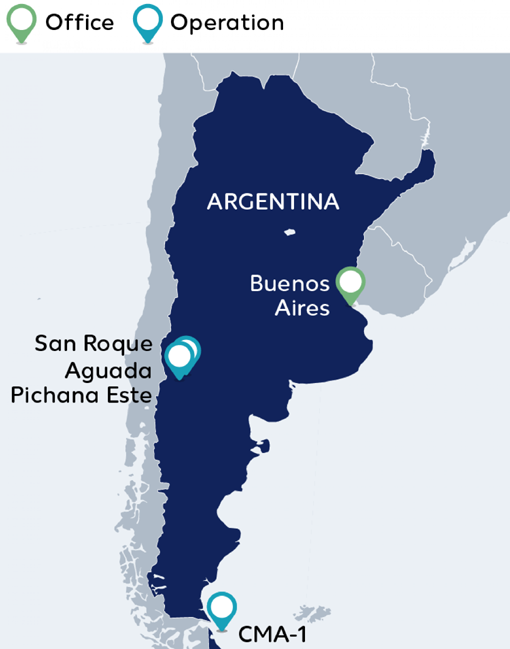
Fenix
Fenix is the latest promising project in the CMA-1 concession, expected to deliver significant natural gas volumes for more than 15 years, thus reinforcing the company’s commitment to Argentina’s gas production in the long run. Wintershall Dea, together with operator TotalEnergies and partner Pan American Energy, reached a final investment decision, amounting to a total of approximately 700 million US Dollars. Part of the cluster is also the world’s southernmost gas production platform Vega Pléyade.
The Fenix project is progessing as planned; first gas is expected in 2025.
UAE
Wintershall Dea has operated there since 2010. The company chalked up a major success in 2018: The national oil company ADNOC awarded it with a 10 per cent stake in the Ghasha Concession. Ghasha is one of the most promising gas and condensate projects that is yet to be developed in the Emirates.
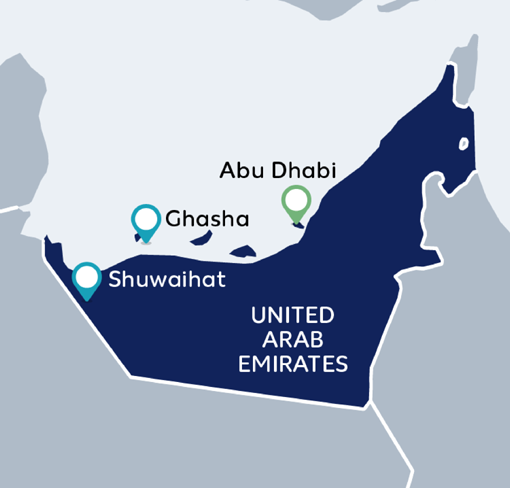
Ghasha
The Ghasha Concession not only contains sour and sweet gas, but also significant quantities of valuable condensate. The fields are the largest gas and condensate fields that have yet to be developed in the Emirates. Daily production of 120,000 barrels of oil equivalent is expected in the maximum expansion stage. The project could therefore cater for the rapidly growing domestic natural gas demand. The gas produced is intended for use in the UAE and will make a major contribution to meet ADNOC's 2030 vision of sustainable and economical gas supply. Through its investment in Ghasha, Wintershall Dea intends to establish a strong long-lasting presence in Abu Dhabi in partnership with ADNOC.
ALGERIA
The oil and gas sector is the backbone of Algeria’s economy. The natural gas project Reggane Nord aims to give it a crucial boost and Wintershall Dea is collaborating in the geologically and logistically challenging venture. Since 2002, Wintershall Dea has been a partner in the Reggane Nord Concession in the Saharan Dessert, which is operated by the Groupement Reggane Nord (GRN), a consortium formed by the project shareholders Wintershall Dea, Sonatrach and Repsol.
The gas fields of the Reggane Nord project are located in the west of the country, in one of the Earth’s hottest regions: the Reggane Basin in the Sahara. It is located 1,500 kilometres from the capital, Algiers, and the same distance from Algeria’s Mediterranean coast.
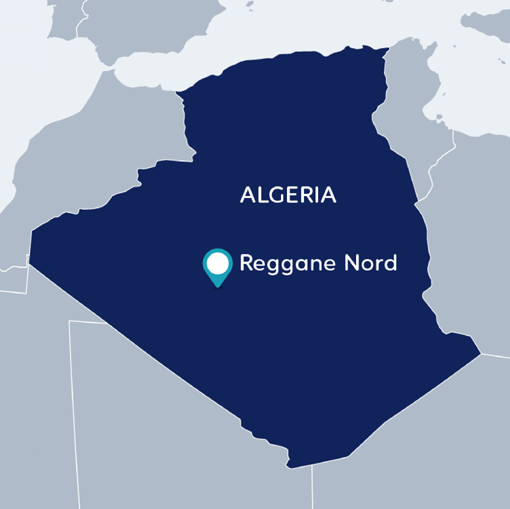
Reggane Nord
The Reggane Nord project comprises six fields (Azrafil Sud-Est, Kahlouche, Kahlouche Sud, Tiouliline, Sali and Reggane) and is the first gas project to start up in the promising region. Following a general and challenging development programme, first gas was celebrated in December 2017 Wintershall Dea and its partners have built a central processing facility and significant infrastructure to process the gas collected from the wells: 209 kilometres of gas collecting systems and more than 160 kilometres of roads were constructed as well as a 74-kilometres-long pipeline connecting the project to Algeria‘s export facilities.
Future opportunities
Wintershall Dea signed a Memorandum of Understanding with Sonatrach in 2020 to identify and potentially access additional business opportunities in the country. In 2022, the partners extended this MOU and widened it to include the consideration of projects with a focus on carbon management and hydrogen.
MEXICO
Onshore to offshore, Wintershall Dea is active in numerous exploration, development and production projects in Mexico. These include the onshore Ogarrio oil field, where Wintershall Dea is operator, holding a 50% share. Ogarrio was discovered in 1957 and currently has around 80 active wells. In the Gulf of Mexico, particularly the Sureste Basin, Wintershall Dea is a key player with shares in ten offshore exploration blocks, three as operator.
A string of milestones in early 2023 have underlined the company’s commitment to the national energy market. Major progress is underway in Mexico.
The latest success was a major oil discovery in Block 30 (‘Kan Prospect’), estimated to contain 200 to 300 million barrels oil equivalent in place. Elsewhere in the Sureste Basin, Wintershall Dea is contributing to Mexico’s future energy supply with a material stake in the producing Hokchi Block and the world class Zama field.

Hokchi Block
In March 2023, Wintershall Dea completed the acquisition of a material stake in the Hokchi Block, offshore Mexico, with a production of about 27,000 boe per day gross (March 2023). Wintershall Dea now holds a 37% non-operated interest in the block, making the company the second largest interest holder after operator Hokchi Energy.
The shallow-water block Hokchi is developed as a subsea tie-back of the producing wells to two offshore platforms, Hokchi Central and Hokchi Satellite, and was brought on-stream in May 2020 following an appraisal campaign. With the acquisition, Wintershall Dea further expanded its portfolio and strengthened its presence in Mexico.
Ogarrio
In 2018, Wintershall Dea received a 50 per cent licence share as well as the operatorship of the Ogarrio onshore oil field. Ogarrio is one of the first producing oil fields in Mexico where – following liberalisation of the energy sector – an international company acts as operator. The field is located about 107 kilometres west of Villahermosa, in the state of Tabasco, Mexico. With operational expertise, competence and agility, the teams in Mexico and Germany have successfully managed the complex and comprehensive process of taking over operatorship of the field in a very short time, immediately after Wintershall Dea's market entry.
The main reservoirs in Ogarrio are located in rocks of the Miocene and Pliocene. Wintershall Dea has extensive experience from its international operations in producing oil and gas from sandstone reservoirs and in using innovative measures to overcome production declines in mature fields.
To optimise the field performance and boost production of the field, which is in production since 1957, Wintershall Dea makes use of its know-how and technology from global projects. Currently, the operator is working on a water flooding project – and makes good progress. Upside potential for Ogarrio is seen based on first promising results from a water injection test.
And Wintershall Dea assumes social responsibility in Mexico: The company established a social programme and invests, among others, in health and education of the surrounding communities in Ogarrio.
Zama
Zama is one of the world’s biggest shallow-water discoveries in the past 20 years, expected to produce up to 180,000 boe per day at peak and contribute significantly to Mexico’s energy supply over the next 25 years. Plans to develop the field efficiently and quickly are in motion, and Wintershall Dea is at the heart of these plans.
An Integrated Project Team has been established between Wintershall Dea, Pemex (operator), Talos Energy and Harbour Energy. The aim is to pool the talents and competencies of all the companies involved, and delegate roles strategically in order to implement the agreed Unit Development Plan (UDP), officially approved by the authorities. The UDP sets out to minimise greenhouse gas intensity by optimising transportation and storage and making use of the best available technology.
Block 30
In April 2023, Wintershall Dea’s first own-operated offshore exploration well, named Kan, resulted in a major oil discovery in Block 30, located in the shallow waters of the Cuenca Salina in the Sureste Basin. Preliminary estimates indicate the discovery may contain 200 to 300 barrels oil equivalent in place. The discovery was made together with partners Harbour Energy and Sapura OMV, who hold 30% interest each in Block 30. Wintershall Dea, as operator, holds 40%.
Block 29
In May 2020, Wintershall Dea and its partners in Block 29 made two significant oil discoveries, Polok and Chinwol. The Polok discovery opened a new play within Mexico’s Salina Basin and was appraised in 2021. The next steps for the consortium of Wintershall Dea, operator Repsol, Petronas and PTTEP are the selection of the most adequate development option for Polok, including the conceptual and pre-FEED studies as well as the evaluation of the subsea and FPSO parts of the project.
EGYPT
Wintershall Dea has been active in Egypt for almost 50 years. The company’s history in the country was rooted in crude oil production. From the 1980s to the early 2020s the company produced more than 650 million barrels in the Gulf of Suez concession. Today, Wintershall Dea is focused on natural gas in Egypt. The company produces gas at Disouq in the onshore Nile Delta as part of the DISOUCO joint venture and as partner to BP for the West Nile Delta offshore gas project.
The onshore concession Disouq in the Nile Delta includes seven gas fields consisting of 19 producing wells. Production started in 2013. Disouq is operated by the sole shareholder DISOUCO, a 50-50 joint venture between Wintershall Dea and EGAS. In 2022, Wintershall Dea and EGAS signed a Letter of Intent to significantly reduce operational greenhouse gas emissions at Disouq.
In early 2020, Wintershall Dea was awarded the East Damanhour exploration block, located to the west of the Disouq development leases in the onshore Nile Delta. In 2021 the company began a drilling campaign that will involve up to seven wells. In late 2022, Wintershall Dea has made a first gas discovery at East Damanhour: The discovery has been tested at peak production of 15 million standard cubic feet per day. Existing infrastructure at Disouq should enable quick development of any commercial discoveries.

Offshore operations
As partner to BP, Wintershall Dea holds 17.25% of two offshore gas projects. Together with BP the company is producing gas in West Nile Delta (WND) and exploring in North West Abu Qir.
The fields of the WND concession are located 65 to 85 kilometres off the coast of Alexandria and were discovered between 2000 and 2010. WND is one of the largest projects in the Mediterranean and consists of five fields with 25 producing wells. First gas from WND was produced in 2017 from the Taurus and Libra fields. In February 2019, two additional fields, Giza and Fayoum, started production, and the fifth and largest field, Raven, followed in 2021. The onshore processing facilities have a total gas processing capacity of 1.4 billion standard cubic feet of gas per day. The gas produced is fed into the Egyptian national grid. The WND project is one of the largest in the company’s history.
In November 2022, operator BP and Wintershall Dea were awarded the North West Abu Qir exploration block. The block is located north of the WND field Raven. North West Abu Qir covers an area of more than 1000 square kilometres with water depths ranging between 600 and 1500 metres. North West Abu Qir complements Wintershall Dea’s natural gas focused portfolio in Egypt.
LIBYA
Wintershall Dea has been involved in the exploration and production of crude oil in Libya since 1958. The company participates in onshore oil production in the Eastern Sirte Basin and holds a stake in the offshore field Al-Jurf.
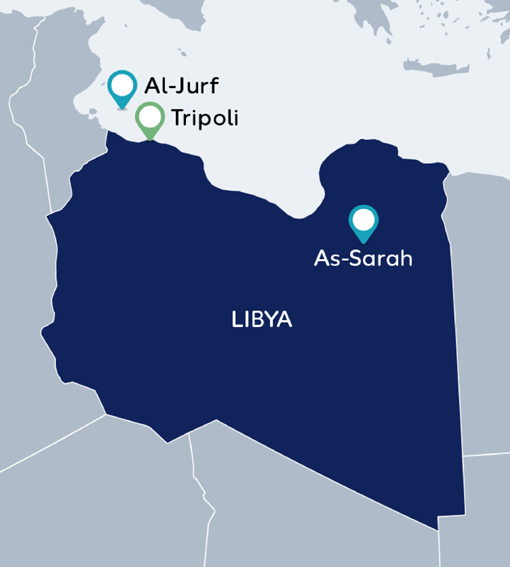
Through its affiliate Wintershall Aktiengesellschaft (WIAG), Wintershall Dea participates in crude oil production from nine oil fields across Contract Areas 91 (former Concession 96) and 107 (former Concession 97) in the Eastern Sirte Basin, about 1,000 kilometres southeast of the capital Tripoli in the Al-Wahat municipality. Since 2008, Gazprom EP International has a share of 49 per cent in WIAG. After 54 years of own operatorship, WIAG in October 2020 has handed over operatorship of Contract Areas 91 and 107 to Sarir Oil Operations, a joint venture of WIAG with Libya’s National Oil Corporation that has been newly established following the conversion of the former concession agreements to the EPSA IV contractual standard at the end of 2019.
Wintershall Dea also holds a minority stake in offshore oil production from Al-Jurf offshore platform in Contract Areas 15/16/32 (former Block C137). The platform, operated by Mabruk Oil Operations, is located in the Mediterranean Sea, about 100 kilometres off the country’s Western coast. Moreover, Wintershall Dea operates Contract Area 58 on the Cyrenaica Plateau as well as Contract Areas 69/70/86/87 (former NC193) and 88/89 (former NC195) in the onshore Sirte Basin, but exploration activities in these areas have been suspended since 2014 due to the difficult security situation.
PRODUCTION
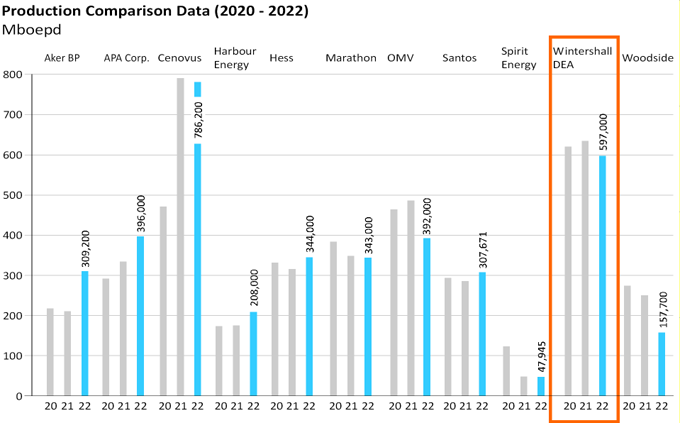
In 2022, the Group‘s daily production averaged 597 mboe/d consisting of 431 mboe/d of gas and 166 mboe/d of oil, representing a decrease of 37 mboe/d compared to 2021. The decrease mainly resulted from the deconsolidation of the Russian entities in the fourth quarter of 2022. Excluding Russia, the daily production declined slightly.
LEADERSHIP & OFFICE LOCATIONS
Dr. Hans-Ulrich Engel, Chairman
Mario Mehren, Chairman of the Board and Chief Executive Officer (CEO)
Dawn Summers, Member of the Board, Chief Operating Officer (COO), Region EMEA
Hugo Dijkgraaf, Member of the Board, Chief Technology Officer (CTO)
Paul Smith, Member of the Board, Chief Financial Officer (CFO)
Headquarters Kassel: Wintershall Dea AG
Friedrich-Ebert-Straße 160
34119 Kassel, Germany
T: +49 561 301-0
info@wintershalldea.com
Headquarters Hamburg: Wintershall Dea AG
Am Lohsepark 8
20457 Hamburg, Germany
T: +49 40 6375-0
info@wintershalldea.com
KeyFacts Energy: Company Profile
 KEYFACT Energy
KEYFACT Energy